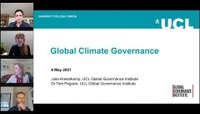GLOBE Webinar | Global Climate Governance
Julia Kreienkamp (University College London) and Tom Pegram (University College London)
Available in video:
Julia Kreienkamp (University College London) and Tom Pegram (University College London) present their book (co-authored with David Coen) "Global Climate Governance" (Cambridge 2020).
The GLOBE Webinar Series – The Future of Global Governance – presents the latest and most cutting-edge research in global governance and gives audience members the opportunity to directly engage with leading scholars in the field. Each webinar focuses on a significant new book that has potential to shape future thought on global governance, featuring a presentation by the author, an intervention from an expert discussant, and a Q&A session with the audience.
Participation is free and the webinar can be joined from anywhere in the world. Access the GLOBE Webinar Channel and check the featured videos for the past webinars
About the book: Climate change is one of the most daunting global policy challenges facing the international community in the 21st century. This Element takes stock of the current state of the global climate change regime, illuminating scope for policymaking and mobilizing collective action through networked governance at all scales, from the sub-national to the highest global level of political assembly. It provides an unusually comprehensive snapshot of policymaking within the regime created by the United Nations Framework Convention on Climate Change (UNFCCC), bolstered by the 2015 Paris Agreement, as well as novel insight into how other formal and informal intergovernmental organizations relate to this regime, including a sophisticated EU policymaking and delivery apparatus, already dedicated to tackling climate change at the regional level. It further locates a highly diverse and numerous non-state actor constituency, from market actors to NGOs to city governors, all of whom have a crucial role to play.
Moderator: Kari Otteburn (KU Leuven)

